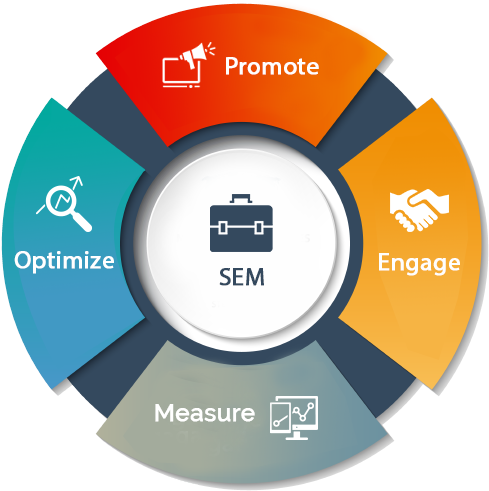Search Engine Marketing (SEM) is a digital marketing strategy that focuses on increasing a website's visibility in search engine results pages (SERPs) through paid advertising. In contrast to Search Engine Optimization (SEO) which aims to improve organic rankings SEM utilizes paid advertising to promote a website and drive targeted traffic from search engines.
The primary platform for SEM is typically Google Ads (formerly known as Google AdWords) where advertisers bid on specific keywords relevant to their products or services. When users conduct searches using these keywords the ads appear at the top or bottom of the search results marked as "Ad" or "Sponsored."


Increased Online Visibility: SEM allows businesses to appear prominently in search engine results when potential customers are actively searching for products or services.
Targeted Audience Reach: SEM allows businesses to target specific keywords demographics locations and devices.
Immediate Results: SEM can deliver immediate visibility and traffic to a website once the ad campaign is launched. This quick impact can lead to faster business growth.
Measurable ROI: SEM offers robust tracking and analytics tools that allow businesses to measure the effectiveness of their campaigns.
Cost Control: SEM works on a pay-per-click (PPC) model meaning businesses only pay when someone clicks on their ad.
Competitive Advantage: In the competitive online landscape businesses that invest in SEM gain a competitive edge.
Reaching Mobile Users: With the increasing use of mobile devices for online searches SEM allows businesses to effectively target mobile users capturing a significant portion of potential customers.
Flexibility and Scalability: Whether a business is starting small or looking to expand SEM services can be adjusted to meet changing needs.
Regularly monitor the performance of your campaigns using the advertising platform's analytics tools or third-party tracking tools. Keep an eye on click-through rates conversion rates and cost per click.
Conduct A/B testing to compare different ad variations landing pages and bidding strategies. Optimize based on the results to improve campaign performance.
Continuously review and refine your keyword list. Add high-performing keywords and eliminate underperforming ones to improve relevancy and reduce wasted spend.
SEM is a versatile and dynamic marketing strategy that offers numerous benefits, including the ability to control spending, target the right audience, and gather valuable data for ongoing business growth. When used effectively, SEM can significantly contribute to a business's success in the digital age.
SEM allows you to target specific keywords and phrases that are directly related to your products or services.
SEM enables you to control the position of your ads in search engine results pages (SERPs).
The data and insights provided by SEM platforms can guide your overall marketing strategy.
SEM can be integrated with other marketing channels such as SEO - social media and email marketing.

Work closely with the consultant to define clear and measurable goals for your client's SEM campaigns. These goals could include increasing website traffic - lead generation - sales or brand visibility.
Understand what competitors are doing in the SEM space. Analyze their strategies and identify opportunities to outperform them.

Collaborate with the consultant to create a well-structured campaign. This includes organizing ad groups creating compelling ad copy and setting up effective bidding strategies.
Utilize ad extensions to make ads more informative and engaging. Consultants can help you take full advantage of available extensions such as site links callout extensions and structured snippets.

Work with the consultant to allocate your SEM budget effectively. They can help you determine the best allocation between different campaigns - keywords and platforms.
Start with a comprehensive assessment of your client's existing SEM efforts. An SEM consultant should perform a thorough audit of the current campaigns looking for areas that need improvement.

PPC stands for "Pay-Per-Click," and it is a digital advertising model in which advertisers pay a fee each time one of their ads is clicked. It is a way of buying visits to your website rather than earning them organically through methods like search engine optimization (SEO). PPC ads are typically displayed on search engines, social media platforms, and various websites and can take various formats, including text, display, or video ads.